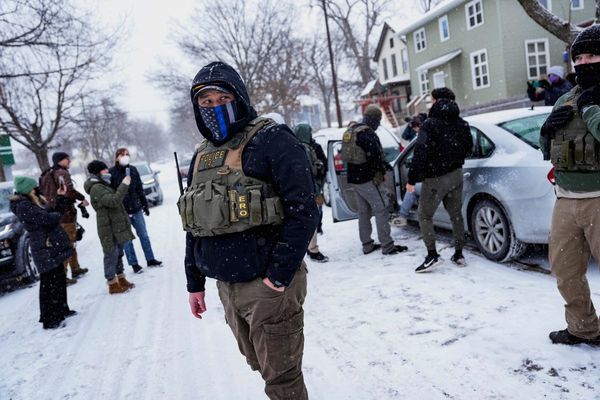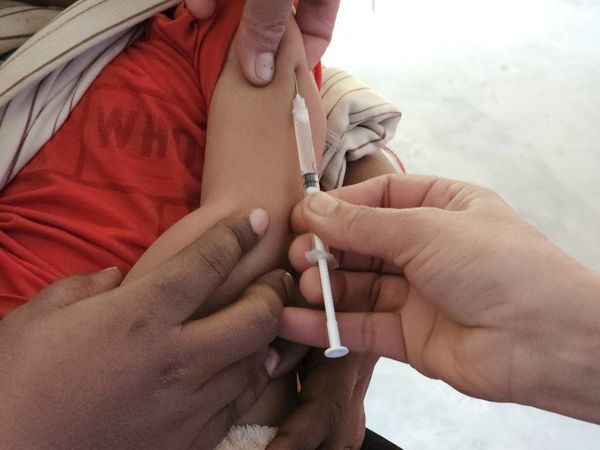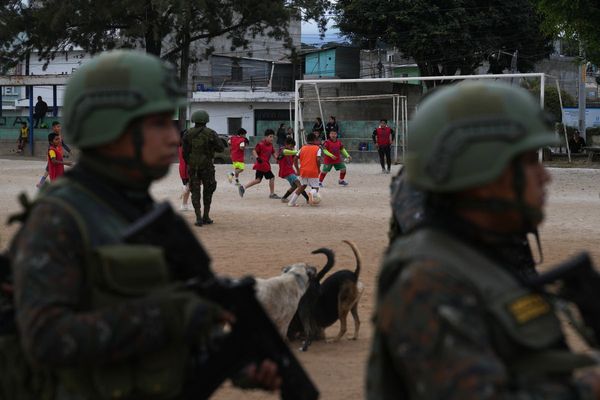
The supply of monkeypox vaccine doses in Australia remains limited despite rising local transmission.
New South Wales health authorities confirmed the state’s first case of local monkeypox transmission on Sunday. NSW has recorded 42 cases to date.
Deborah Friedman, an associate professor and Victoria’s deputy chief health officer for communicable disease, warned on Saturday that the number of people infected in the state was increasing due to community transmission. About half of Victoria’s 40 monkeypox cases had been acquired through local transmission, she said.
The rollout of Jynneos, a third-generation smallpox vaccine which is also effective against the monkeypox virus, commenced earlier this month.
Overseas, the vaccine was approved years ago, but in Australia it is not yet officially registered for use. While demand for Jynneos has been high, why has supply been so limited in Australia?
Other countries had Jynneos vaccine stockpiles. Why didn’t Australia?
Jynneos is a vaccine made from modified vaccinia Ankara virus, which has been weakened and cannot replicate in human cells. It has not been assessed by Australia’s medicines regulator, the Therapeutic Goods Administration, but has been made available for use via an emergency pathway.
Jynneos has been licensed for use against both smallpox and monkeypox in the US since 2019. The vaccine was approved in Canada and the EU – where it is known as Imvamune and Imvanex respectively – for preventing smallpox in 2013, and approval for its usage was later expanded to include monkeypox.
Some countries had stockpiles of Jynneos prior to the current outbreak, including the US, Canada, France and the Netherlands.
Prof David Tscharke, head of immunology and infectious diseases at the Australian National University, said stockpiling vaccines such as Jynneos began in the early to mid-2000s, born of concerns about the potential use of viruses as bioweapons.
“People stockpiled these vaccines more against smallpox than monkeypox, because you get protection against both of those infections,” Tscharke said. “There was a particular concern at that time that there might be bioterrorism … That was as a direct result of the 9/11 attacks, and then anthrax being put in the mail in the US.
“Monkeypox is one of those things that people who are watching have been concerned about for a while, but I genuinely don’t think it was on the radar in Australia,” Tscharke said.
Experts in some African countries where monkeypox outbreaks have previously occurred “have been worried and have been shouting into the void for decades,” Tscharke said. “It’s one of these really classic examples … where we ignore what’s happening in the developing world at our peril.”
Like several other countries, Australia has a national stockpile of a second-generation smallpox vaccine, ACAM2000. However, this vaccine is derived from a live pox virus related to smallpox and monkeypox, making it unsuitable for use in people who are immunocompromised or pregnant. Jynneos also has fewer side-effects.
Stockpiling vaccines for potential use required a “delicate balance”, said associate professor Paul Griffin, the director of infectious diseases at Mater Health Services.
“We don’t want to utilise resources stockpiling vaccines that we don’t use,” he said. “It’s not just simply a case of saying ‘we should always have lots on hand, just in case’, because it does take significant resources.”
The US had a national stockpile of more than 20m doses of Jynneos in 2014. These had mostly expired by the time the latest monkeypox outbreak began, with only 36,000 doses immediately available.
Global supply shortage
The World Health Organization has expressed concerns about the limited availability of monkeypox vaccines, estimating there are about 16m Jynneos doses available globally.
The head of the WHO, Dr Tedros Adhanom Ghebreyesus, said last week: “We remain concerned that the inequitable access to vaccines we saw during the Covid-19 pandemic will be repeated and that the poorest will continue to be left behind.”
There is only one manufacturer of Jynneos in the world, a Danish biotechnology firm called Bavarian Nordic. According to its website, the firm has worked with the US government since 2003 on the vaccine’s development.
“It was a vaccine that wasn’t in high demand previously. Now that demand is enormous, they’ve not been able to meet that,” Griffin said.
As part of a planned expansion, Bavarian Nordic’s bulk manufacturing facility was shut from August 2021 and only reopened earlier this month.
How many doses are available in Australia?
The Australian government announced this month that it had bought 450,000 doses of the Jynneos vaccine, with an initial tranche of 22,000 doses.
“I think we’ve done a good job securing 450,000 in total,” Griffin said. “It would be great for us to have more.”
As part of the first phase, 3,500 doses have been sent to Victoria and 5,500 to NSW, state health authorities have confirmed, with strict eligibility criteria. Victoria is expecting more than 20,000 vaccines in September, and NSW will receive up to 30,000 doses.
A total of 100,000 doses will be shipped across the country in the last quarter of 2022, with the remaining 350,000 to arrive in early 2023.
The health minister, Mark Butler, said earlier this month the previous government had begun negotiations for the Jynneos vaccine on 20 May, one day after the first case in Australia.







